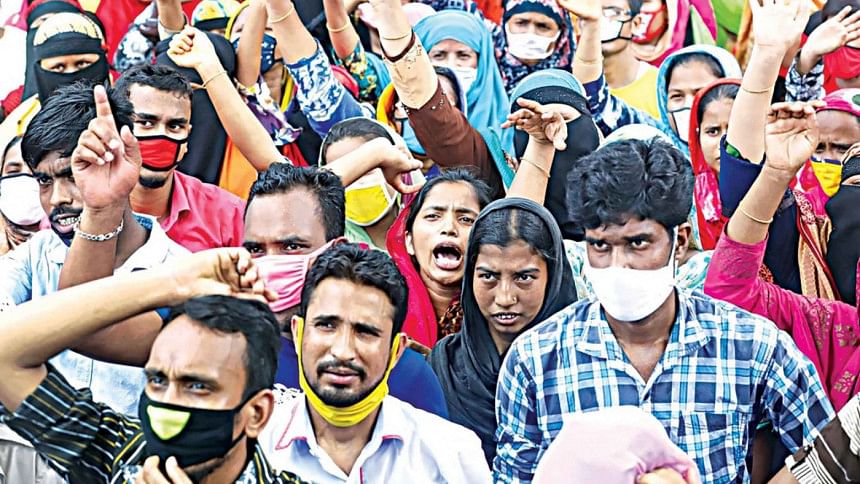Understanding poverty through Maslow’s Hierarchy of Needs

Poverty is indisputably the worst curse in human life. It reduces human existence to nearly non-existence. It is demeaning and humiliating. Mere day-to-day survival is the prime concern of the poverty-stricken life. The thought process of the poor seldom transcends beyond the threshold of survival. Poverty-stricken people in a society or nation are considered a burden and generally looked down on.
An American psychologist, Abraham Maslow, came up with the theory of the hierarchy of human needs in 1943. Known as the pyramid of needs, it begins with the most basic human needs and climbs up the pyramid to the most challenging needs. Using the pyramid model, Maslow created a classification system reflecting five sets (or stages or tiers) of human needs.
Modern-day psychologists categorise the two most basic sets of needs—physical and security—as "material" needs, while the top three sets of needs are categorised as "spiritual" needs. Maslow underscored that human beings can hardly focus on the next tier of needs unless a significant proportion of their needs in the tier below are met.
Now, let us juxtapose the needs of the poor with Maslow's Hierarchy of Needs. If the needs in the first tier—classified as physical needs (such as air, water, food, rest, health)—are further broken down according to their necessity in human life, air and water come first. Fortunately, nature is generous in bestowing the living beings with plenty of air and water to breathe and drink and meet other necessities. Constant fiddling with nature over time has, however, fundamentally affected the quality of air and water, which are absolutely essential for our survival. The poor have no time to spend on the issue as they immediately shift to the mode of seeking food, their most tangible basic need.
Most of the people living in extreme poverty are relentlessly engaged in securing sufficient food to survive on a day-to-day basis. They are so absorbed in the hunt for food that they only rest when their physical limitations force them to do so. The question of healthcare crosses their mind only when they fall sick, restricting their ability to seek food.
When the most basic needs in the first tier of "material" needs are met, the poor look for satisfying the next tier of material needs, classified as security needs (such as safety, shelter, stability). In this tier, the poor look for safety essential for consolidating their livelihood, a shelter for those who don't have it, or improving the shelter's overall condition for those who have it. Consolidating their livelihood brings some semblance of stability in their mindset.
At this tier, the poor as well as those graduating out of poverty explore various ways and means for a brighter future for them and their children. They delve into trying different means of sustaining their newly found interim stability to avoid being thrown back into extreme poverty. Children's education and alternative means of making livelihoods are explored diligently. In other words, they look for opportunities to improve their living conditions and grab them whenever those come their way.
Some succeed in crossing the bar of this tier into the next higher tier (also the first in the upper three tiers collectively classified as "spiritual" needs). Others languish in the tier below either in poverty or at the edge of poverty. Some even slip back into extreme poverty.
Most of the poor remain confined in the first two tiers classified as "material" needs. They need support from the state as well as benevolent organisations to pull them out of poverty and help move to the next tier, also the first of the upper three tiers classified as "spiritual" needs. (These remaining three tiers basically involve self-fulfilment and psychological needs, such as the need for love, belongingness, recognition, self-esteem, power, prestige, achieving one's full potential, etc.) The people in abject poverty, however, remain mostly absorbed in arranging necessary food for them and their families, a shelter of some kind, and healthcare when falling sick.
At this stage, necessary support is essential to prepare this segment of the population for a productive economic life. Once the most basic human needs—food, shelter and healthcare—are met, the focus should shift to creating economic opportunities for them via skills development, financial support and creation of employment opportunities of various kinds.
Ideally, no one in a civilised society should live in poverty. Such expectations are not very practical, however. There will always be some people mired in poverty for various endogenous factors. The aim, therefore, should be to bring the proportion of people living below the poverty line to a bare minimum in order to enable a nation to put its available human resources to the best possible use.
If a large segment of the population languishes in poverty, a nation's full potential will remain unrealised. The poor will relentlessly struggle to meet their basic material needs, meaning they will remain stuck in the bottom two tiers of Maslow's Hierarchy of Needs. They will be restrained from exploring the finer sides of human potential like love and care, social activities, status, esteem and above all, doing something remarkable for the society or nation.
Poverty not only stunts human growth but also gravely demoralises the people, restricting them from thinking positively, creatively and critically. In an aggravated situation, it may increase criminal activities, cause social unrest and jeopardise the peace of a nation.
It need not be so. With some calculated efforts, the poor can be turned into a treasure capable of transforming a nation into a peaceful hub of economic prosperity.
ASM Jahangir is a former Senior Program Manager of USAID, Bangladesh.

 For all latest news, follow The Daily Star's Google News channel.
For all latest news, follow The Daily Star's Google News channel. 



Comments